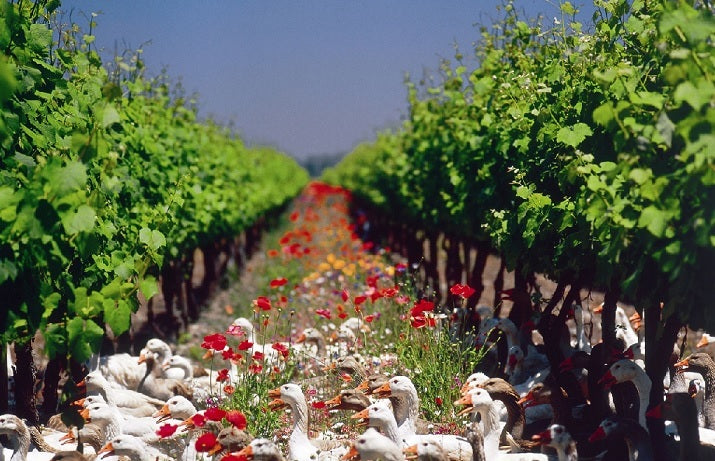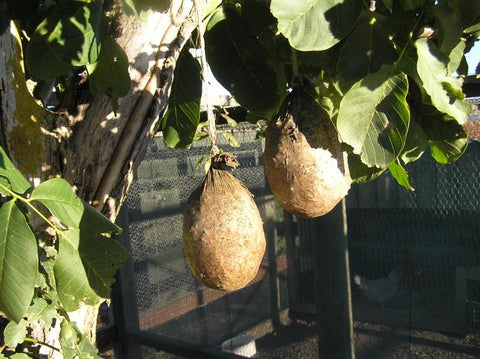Au naturel?

Following the Pope’s announcement that from now on, communion wine should be of the ‘natural’ variety only, I thought I’d give a brief explanation of what exactly this means and where ‘natural’ wine fits in with organic and biodynamic.
Organic wines
Wines certified as organic are subject to a whole host of rules, the main thrust though is that artificial chemicals cannot be used and that the farmer should encourage a biodiverse, sustainable ecosystem in the vineyard. This will to some extent keep bugs, weeds and diseases under control (i.e. ladybirds eating aphids, sheep eating weeds, chickens eating grubs), and the biodiversity will in turn lead to healthy soils, stronger vines and better grapes.
Sulphites (preservatives) can be used but the maximum allowed is much lower than in conventional wines. That’s the rule in the EU anyway, in the U.S. no sulphites can be added to organic wines.
Click here for a brilliant video showing a quack squad (sorry) of Indian Runner ducks keeping pests under control.
Biodynamic wines
Biodynamic wines are made according to the farming practises suggested by the philosopher and all round genius Rudolph Steiner in the early 20th Century. Much of what he proposed tallies with organic farming methods but some of his theories haven’t exactly been accepted by the scientific community. His emphasis on the importance of the positions of the planets when tending to the crops for example; and some of the organic preparations that he devised:
Preparation 505: Oak bark is sheathed in the skull of a farm animal and buried in a watery environment over winter, then dug up. The skull's contents are removed and inserted in the compost (the used skull is discarded). Provides "healing forces" to prevent disease.

Biodynamic Preparation 502: Yarrow flowers are encased in a stag’s bladder, hung up in a tree over summer, then buried over winter.
The amount of sulphites that can be added to wines labelled as biodynamic is lower than that of organic wines.
Natural wines
The ‘natural’ wine movement is a recent addition and unlike organic and biodynamic, it is not certified in any way. In fact the exact definition is really quite unclear. In essence though it is organic/biodynamic production taken to the next level, with even less intervention in the vineyard and fewer additions in the winery (i.e. chemicals, acidification, added sugar etc). The aim being to produce wines that are as honest a representation of the 'terroir' as possible. These wines often have very little or no sulphites added to them.
So, which is best?!
In my view, organic practices are clearly a step in the right direction and the label should give the consumer some reassurance. It’s not perfect though - just because a substance (a fungicide for example) is ‘naturally occurring’ and therefore allowed under organic rules, it doesn’t necessarily mean that it is better for you or the environment than an artificially created one. Copper Sulphate for example, nasty stuff but allowed in organic vineyards, because, well, it's seriously handy and the most organic option available. Admittedly, organic regs don’t allow as much of it to be used as in conventional vineyards though.
Biodynamics? I’m generally in favour of this as well. Despite the lack of scientific explanation for some biodynamic practices, it clearly does no harm, and there is evidence that suggests that vines and ecosystems seem to benefit from it. On top of that, if a vigneron is willing to go to these lengths then that is surely an encouraging sign.
Natural wine? Well it is quite hard to argue against an approach to wine making that is not actually defined. The obvious problem though is that because the movement more or less spurns sulphites, there are too many producers in this category making faulty wines. This was clearly the case when I went to a recent ‘natural’ wine fair – too many of the wines were, in my book, basically ruined.
So, to sum up, it seems to me that the best approach is not actually categorised. It would be a combination of organic and perhaps biodynamic practices with the use of non-organic pesticides, herbicides etc when it makes better sense for the environment and vineyard. There are plenty of excellent winemakers who follow this approach but as a result they don't qualify for the organic or biodynamic certification.
As a rule though, organic and biodynamic labels are good indicators that the wine is relatively nasties-free; and as for ‘natural’ wines, well, good intentions, but for the moment it’s not actually clear to me what this means. Other than that next time you take communion, the wine might taste like old socks.

